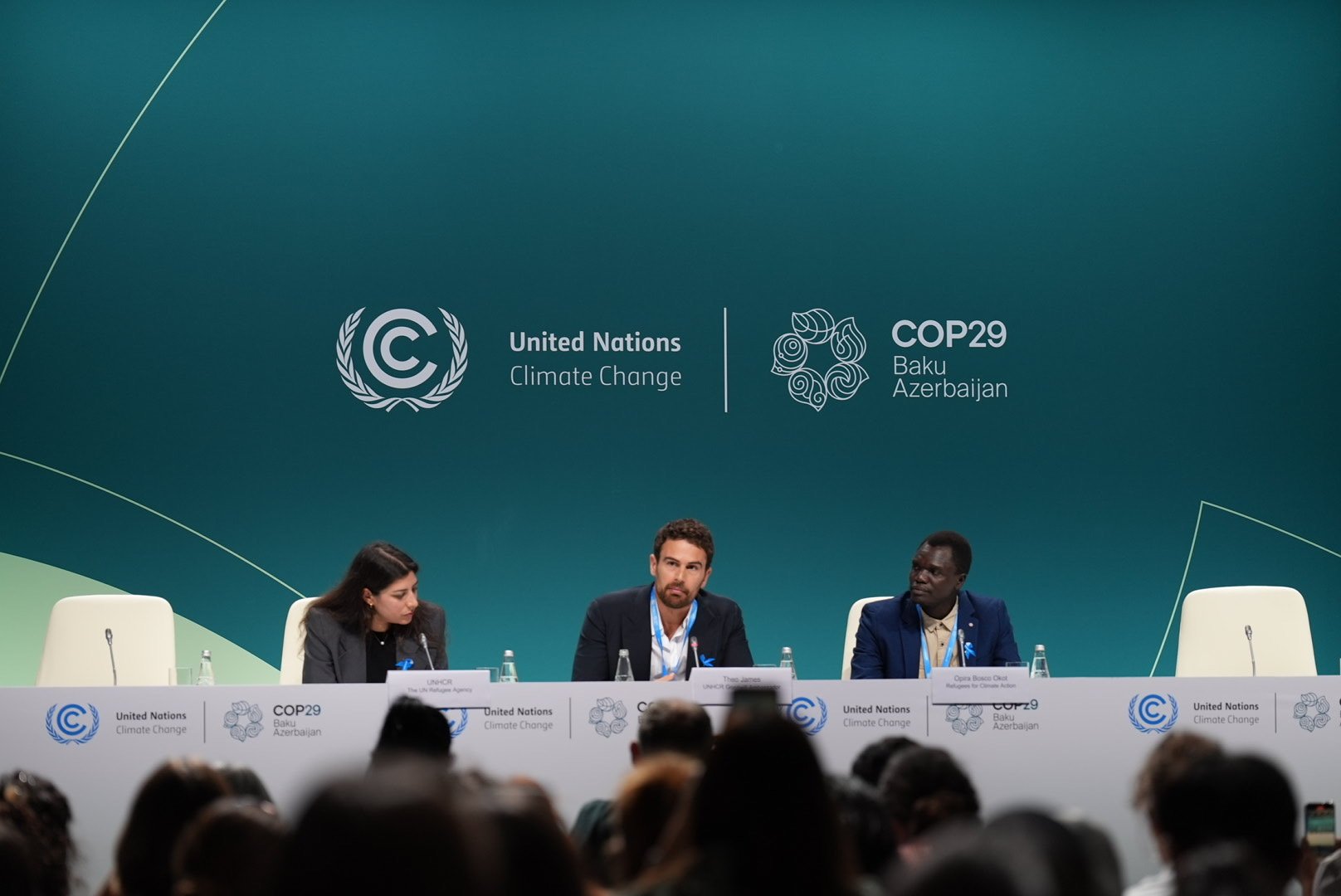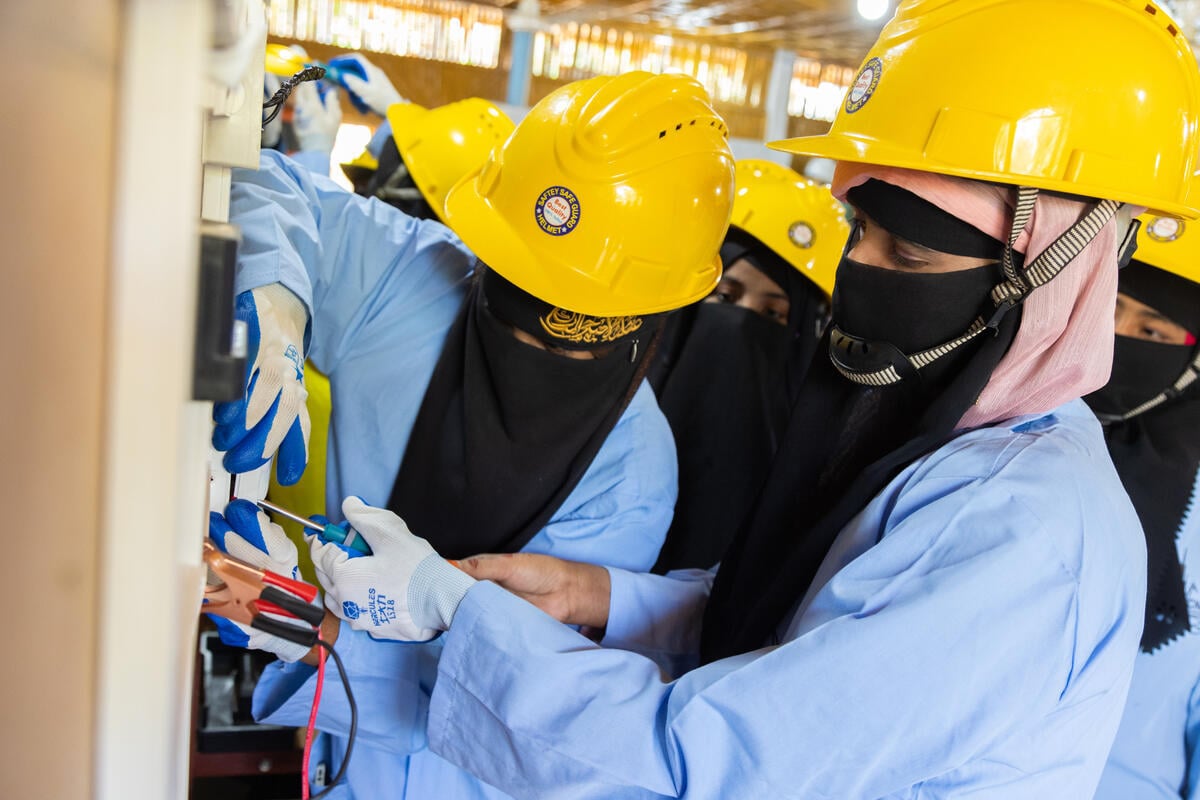Refugee activists at COP29 call for funding and support to withstand climate threats
Refugee activists at COP29 call for funding and support to withstand climate threats

Actor and UNHCR Goodwill Ambassador Theo James (centre) and refugee climate activist Opira Bosco Okot (right) at the launch of the "Refugees for Climate Action" network at COP29 on Thursday.
Refugees and other forcibly displaced people living on the frontlines of the global climate crisis had a clear message for leaders and delegates attending the COP29 summit in Azerbaijan this week: as the climate crisis makes their lives ever more precarious, they need more funding and support to survive and adapt.
“No matter how hard we try to build the lives we want for ourselves, the fight gets harder with each passing day because of climate change,” said Grace Dorong, a former refugee from South Sudan and founder of the NGO, Root of Generations.
She listed the multiple hazards her country is facing, including drought and flooding, as well as the conflict in neighbouring Sudan that has driven nearly 850,000 refugees and returnees across the border. She described their plight now “as moving from a frying pan into a fire.”
“Refugees have no escape,” she added. “You flee in one direction; you are met with danger. You flee in another direction; you are met with another danger. The climate crisis is drastically impacting our lives.”
Dorong was addressing delegates at the launch on Tuesday of a new report by UNHCR, the UN Refugee Agency, that explores the complex links between the climate crisis, conflict and forced displacement. Written in collaboration with 13 expert organizations, research institutions and refugee-led groups, it finds that three out of every four of the 123 million people displaced by conflict are also struggling to withstand the devastating and growing effects of climate change. This is because the majority of displaced people are hosted in areas of the world that are highly exposed to climate hazards.

Climate activist and former refugee Grace Dorong at COP29 in Baku, Azerbaijan.
As climate shocks become more extreme, displaced people are increasingly being forced to move again and again, with little hope of being able to return home, as more parts of the world become uninhabitable.
“We see on the ground the human impact on the most vulnerable people of what is being discussed here at COP29,” said UN High Commissioner for Refugees, Filippo Grandi, who also spoke at the report launch. “For people like Grace, this is not theoretical; this is an everyday reality that dramatically impacts their lives.”
Gaps in climate finance
Despite being among those most affected by the impacts of climate change, refugees and host communities in fragile and conflict-affected countries are not being reached by climate financing that could help them adapt. The report notes that 90 per cent of climate finance is going to middle-income, high-emitting countries while only 2 per cent goes to extremely fragile countries.
“This represents a profound injustice,” said Grandi. “It is extremely important that development actors take more risks, making sure that climate action includes the most fragile parts of the world.”

UN High Commissioner for Refugees Filippo Grandi at COP29 alongside refugee climate activists Opira Bosco Okot (left), and Grace Dorong.
In a positive step towards improving flows of climate finance to displaced communities, UNHCR signed a Memorandum of Understanding (MoU) this week with the Green Climate Fund (GCF), the world’s largest climate fund. The MoU aims to pair UNHCR’s knowledge and expertise working in fragile- and conflict-affected settings with the GCF’s goal of scaling up the delivery of climate finance to developing countries.
On the sidelines of this week’s talks, UNHCR held a joint event with the International Organization for Migration (IOM) about the importance of including refugees and migrants in climate finance decision-making. Opira Bosco Okot, a 28-year-old South Sudanese refugee and climate activist, pointed out that refugee-led organizations are capable of bringing transformative climate responses to their communities, but they need support with capacity building and adaptation.
“There’s been limited climate financing that has reached displaced communities,” he said, adding that of the very few refugee-led organizations that were receiving funding, it was restricted and short-term, affecting their sustainability.
New network of refugee activists
Okot is part of a new coalition of climate-activist refugees and displaced people from across the globe who are joining forces as part of a new coalition – the Refugees for Climate Action – which launched at COP29 on Thursday.
Convened by UNHCR, the group will provide a platform for the urgent messages its members have to share about how the climate crisis is making life even more precarious for those forced to flee. Besides Okot, the network’s eight members include Mohamed Anowar, a young Rohingya refugee from Myanmar living in Bangladesh; Ermano Prévoir, a Haitian refugee and passionate environmental advocate living in Brazil; Eman Al-Hamali, who leads a group of internally displaced women in Yemen running a solar microgrid plant; and Jeanne Muhimundu, a Rwandan climate and environmental activist living in a refugee camp in Zimbabwe.
At the launch on Thursday, Okot was joined by actor and UNHCR Goodwill Ambassador Theo James.
Last month, James travelled with UNHCR to Mauritania, an arid country that has experienced intense climate shocks in recent years, including seasonal floods, crippling droughts and extreme heat. He met refugees who had fled conflict in Mali in recent years and are hosted in Mbera camp in the southeastern Hodh Chargui region.
“They told me about how life is becoming untenable in the desert,” James said at the launch. “They have escaped war, only to fight another battle with the impacts of climate change. They are facing a food crisis, a water crisis, a shelter crisis, and ultimately, a survival crisis.”
Okot and James urged delegates at COP29 to ensure that refugees are included in climate discussions and in climate financing.
“We stand committed to advocating for the voices that often go unheard and overlooked,” said Okot. “We are standing up for our planet, claiming our place at the table, not just to speak, but to advocate for climate justice.”
Additional reporting by Kristy Siegfried









